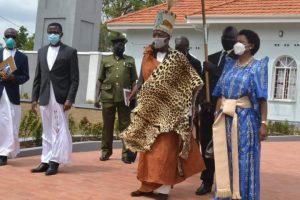
#OutToLunch Kabaka’s refurbished Rolls Royce shows Uganda’s automotive potential
#OutToLunch Kabaka’s refurbished Rolls Royce shows Uganda’s automotive potential By Denis Jjuuko One Sunday morning a few weeks ago, Kabaka Ronald Mutebi, clad in a kanzu turned up at his palace in Mengo to celebrate his belated 67th birthday. On 13 April, the actual day of the celebration, the Kabaka was away in Europe. So the celebration was postponed until after his return. For the first few years of Charles Peter Mayiga’s Katikkiroship, the kingdom always wanted to celebrate the birthday with a big milestone. At one stage it was the completion of the Masengere building that stands besides Bulange in Mengo which had remained incomplete for nearly 40 years, the Nnamasole Nalule building at Lubiri High School in Buloba or the Mulondo House at the kingdom’s technical and vocational institute in Lubaga among others. This time round, it was Kabaka’s famed Rolls Royce Phantom V Cloud — one previously used by his father before the attack on the palace in 1966. The car had been severely damaged and ransacked of some of its vital parts and eventually kept at the Uganda Museum where I have no doubt was an unwanted eye sore to the management and the visitors who turned up. It must have been a relief to the managers when the vehicle was taken away. It was in a bad shape. Scrap metal dealers must have been smarting themselves for the day it would be considered for auction. Yet the kingdom wanted it back not for its scrap metal value but to refurbish it and use it as a ceremonial vehicle whenever the Kabaka wishes. The government of Uganda had no qualms about it — after all it was a scrap metal in every sense of the word. The kingdom embarked on refurbishing it setting up a committee led by Kampala businessman John Kiyimba Freeman. Refurbishing a car that is almost 60 years old is a daunting task as spare parts are not usually available. Even just today repairing a Corolla DX or Toyota Stout is challenging yet these are cars of the 1990s. The kingdom managed to raise the money to enable it put the car back on the road — glittering like a lizard that has just been dipped in fresh milk to use the late musician Mowzey Radio’s famous lyrics. It is a remarkable achievement that saw Kabaka Mutebi smiling through his face mask and like most times when he is happy, whispering to a number of his most senior officials in his company. Besides the symbolism of the kingdom reconstructing its history for its heritage, the refurbishment of the vehicle talks to our increasing capacity in the automotive sector. The automotive industry is a catalyst for overall development due to the practical skills that people adopt. A car on average has 30,000 parts made by many different smaller companies in the automotive value chain. Wherever a vehicle plant is set up, many other industries that employ far more people thrive. Banks, supermarkets, recreation facilities, insurance and real estate among others set up. The automotive industry creates millions of jobs directly and indirectly. The guys who worked on Kabaka’s Rolls Royce’s seats, for example, can work on seats of any vehicle so are the people who fit seats in Uganda’s taxis that are largely cargo vans prior to shipment from Japan. Looking at the trim of Kabaka’s limousine and the painting job executed shows how skilled these people are. But also to turn a car that hasn’t been on the road in almost 60 years up and running is not for the faint hearted. The Kabaka’s Rolls Royce had an automatic gearbox and power windows as well as an air conditioning that was only designed to keep the occupants warm. Today, one needs a car with an air conditioner for all weather patterns. So the mechanics, all Ugandans, figured out a way to upgrade the air conditioning so that it could also provide cool air after all we live in tropics. These guys have practical skills necessary in today’s world and which are crucial in having our automotive industry off the ground. In many countries that have developed, the automotive industry has been a key player in creating not only sustainable decent jobs but also in spurring the growth of other sectors. If there is any evidence needed of how much potential our automotive industry has got, the Kabaka’s Rolls Royce story provides a perfect example. It is time to accelerate the automotive industry in Uganda to catapult us into the middle-income category without any world bank doubting us. The writer is a communication and visibility consultant. djjuuko@gmail.com 2 Comments


